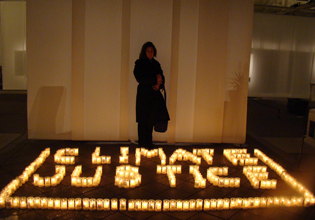|
||||||||||
|
WITH NON-GOVERNMENTAL GROUPS INCLUDING THE CENTER EXCLUDED, CLIMATE TALKS APPROACH SICKENING DENOUEMENT 10:00 a.m.
After slashing admission numbers for nonprofit attendees and arbitrarily ejecting some organizations altogether yesterday, the Danish government and UNFCCC Secretariat limited nonprofit attendance to only 55 individuals, including five Americans. This is unprecedented and excluded thousands of people who have travelled from all over the world to influence, observe, and report on these negotiations. So now on Friday morning Brendan and I find ourselves in one of the many rapidly organized offsite NGO workspaces in downtown Copenhagen, watching live feed from the Bella Center on several massive video screens. On one screen we’re watching the heads of state and ministers arriving at the Bella Center, while another screen shows the plenary room, where Obama is scheduled to speak shortly, starting to fill up. Shimon Peres has just arrived, accompanied in his motorcade by Thomas Friedman, and the two pose for a photo in the main hall before Peres continues on into the Center. 11:50 a.m. We’ve been sitting for two hours watching a hundred or so heads of state waiting in the plenary room for President Obama to arrive and deliver remarks scheduled for 10:00 am. We have now heard that Obama has scrapped his schedule and is closeted with a small group of other countries trying to work out some kind of last-minute deal, while the rest of the world is waiting in the plenary room. This, of course, is not how it is supposed to work. For two years the rest of the world has been working toward a democratically established agreement in which each nation has a voice. This conference was not supposed to end with a hastily cobbled together back-room deal. Now in the plenary, the “informal” session of speeches is beginning. Prime Minister Rasmussen of Denmark and Secretary General of the U.N. Ban Ki-Moon both deliver speeches that we seem to have heard many times below. Wen Jiabao, President of the State Council, The People’s Republic of China, delivers a speech as well. Brazilian President Luiz I. Lula da Silva, President of Brazil, delivers a stirring speech in which he deplores the slow progress in light of the fact that we now know that climate change is far more serious than we could previously have imagined. He states that Brazil does not need financial assistance for adaptation, and will even agree to use its resources to help more vulnerable nations. He says that he hopes for a miracle to save the negotiations, and wants to be a part of that miracle. Next President Obama emerges from behind a back door to the plenary room to deliver his remarks. He says that our ability to take collective action is currently in doubt. He says he came here not to talk, but to act. But then he simply continues to repeat the same empty rhetoric in delivering an ultimatum to the rest of the world: the United States has put its proposal on the table, take it or leave it. Independent scientists have long been warning that the U.S. targets, even combined with the much stronger targets other countries are willing to adopt, would spell disaster for the planet. For the small island nations, at risk from rising seas and monster storms, achieving a science-based agreement that will return carbon dioxide levels to 350 ppm is literally a matter of survival. As President Nasheed of the Maldives has put it, the deal on the table is nothing less than a suicide pact. After his speech President Obama was closeted with a small group of leaders on and off for the rest of the day. In the meantime, we watched speeches and other proceedings at the conference, joined more than 1,500 people in a march to protest the continuing imprisonment of people arrested for peaceful protest over the past several weeks, and took part in the creation of a candlelight human installation of “climate shame” to mark our dismay at the state of the talks, organized by 350.org. 10:30 p.m. At 10:30 p.m. Copenhagen time, a non-binding, non-specific “deal” that Obama negotiated with the small group was announced, though as I write this at 1:00 a.m. Copenhagen time it is still unclear whether this “Copenhagen accord” will be accepted by the countries that were excluded from the negotiations. While we all know what we need to do to solve the climate crisis, even the architects of this deal acknowledge that it does not take those necessary steps. Merely acknowledging the weaknesses of the deal, as President Obama has did tonight, does not excuse its failings. If this is the best we can do, it is not nearly good enough. We stand at the precipice of climatic tipping points beyond which a climate crash will be out of our control. We cannot make truly meaningful and historic steps with the United States pledging to reduce CO2 emissions by only 3 percent below 1990 levels by 2020. The science demands far more. The people of the United States voted for President Obama based on his promise of change and hope. But the only change today’s agreement brings is a greater risk of dangerous climate change. And the only hope that flows from Copenhagen stems not from the president’s hollow pronouncements but from the birth of a diverse global movement demanding real solutions and climate justice — demands made with a collective voice growing ever louder such that in short order politicians will no longer be able to ignore it. Next entry - Copenhagen: The Good, the Bad, and the Ugly |
| Polar bears on Hudson Bay © Brendan Cummings | HOME / DONATE NOW / SIGN UP FOR E-NETWORK / CONTACT US / PHOTO USE / PRIVACY POLICY / E-MAIL THIS PAGE |





